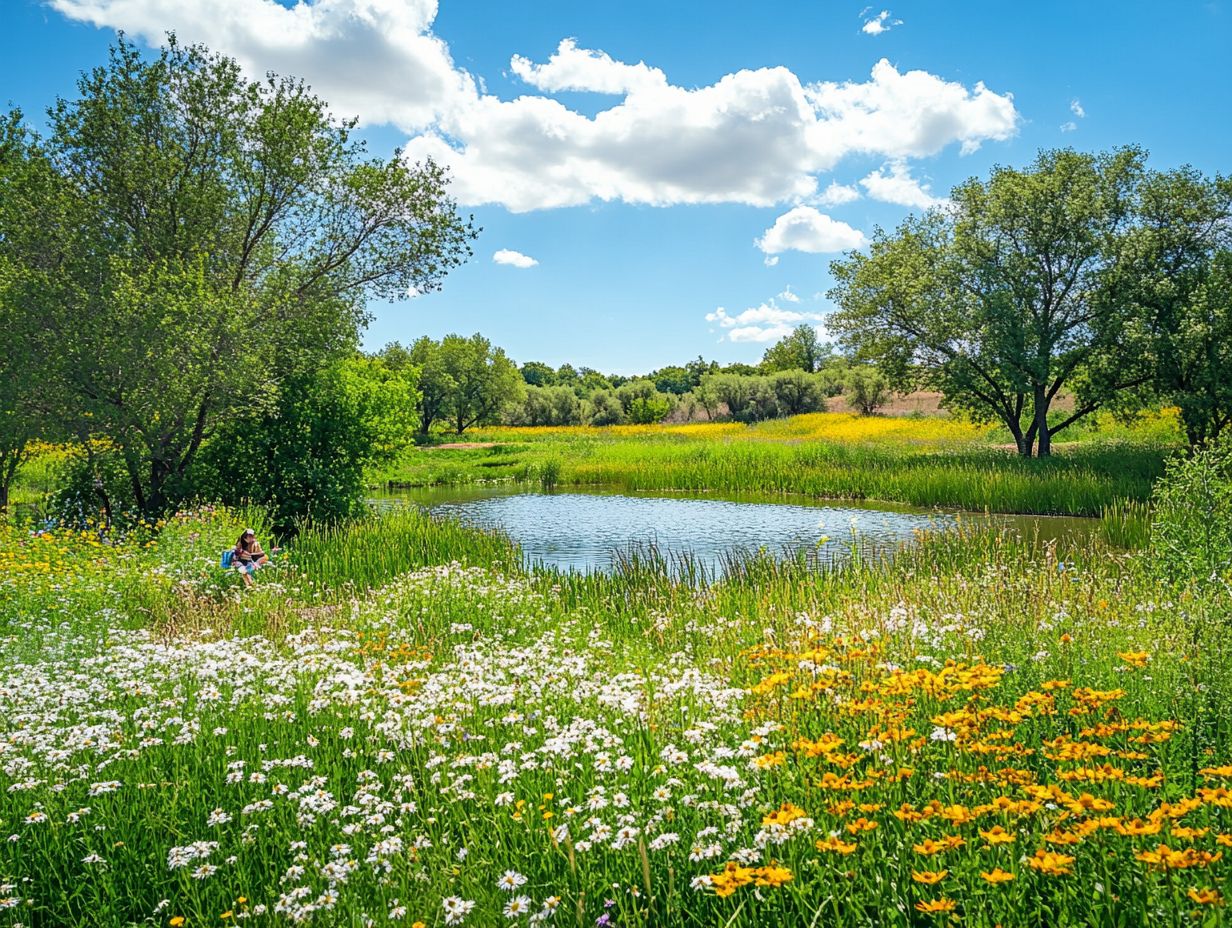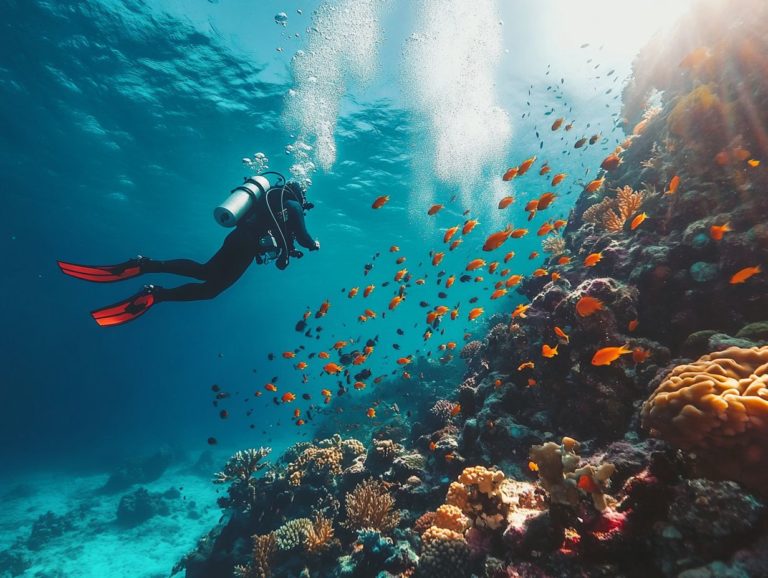5 Must-Visit Eco-Friendly Nature Reserves
Nature possesses an extraordinary ability to captivate your senses, serving as a reminder of the beauty that graces our world.
From the vibrant biodiversity of the Amazon Rainforest to the amazing landscapes of Yellowstone National Park, eco-friendly nature reserves provide unforgettable experiences for every visitor.
Get ready to discover five incredible reserves that you simply can’t miss, each showcasing unique features, conservation initiatives, and practical ways for you to minimize your impact while enjoying the surroundings.
Discover how these breathtaking natural wonders can inspire you to embrace a more sustainable lifestyle.
Contents
- Key Takeaways:
- 1. Explore the Biodiversity of the Amazon Rainforest
- 2. Discover the Pristine Beauty of the Galapagos Islands
- 3. Witness the Majestic Wildlife of the Serengeti National Park
- 4. Immerse Yourself in the Stunning Landscapes of Yellowstone National Park
- 5. Experience the Serenity of the Great Barrier Reef
- What Makes These Nature Reserves Eco-Friendly?
- Frequently Asked Questions
- What are the top 5 eco-friendly nature reserves to visit?
- What makes a nature reserve eco-friendly?
- Why should I visit eco-friendly nature reserves?
- How can I ensure I am being eco-friendly while visiting these reserves?
- What kind of activities can I do at these nature reserves?
- How can I support these nature reserves even after my visit?
Key Takeaways:

- Discover the diverse flora and fauna of the Amazon Rainforest, one of the world’s largest eco-friendly reserves.
- Experience the unique and untouched beauty of the Galapagos Islands, a protected nature reserve known for its conservation efforts.
- Witness the amazing wildlife of Serengeti National Park, a prime example of sustainable tourism and responsible conservation.
1. Explore the Biodiversity of the Amazon Rainforest
The Amazon Rainforest unfolds like a vibrant tapestry of biodiversity, brimming with unique flora and fauna. It stands as one of the world s most important ecosystems, crucial for conservation efforts and sustainable travel initiatives, positioning itself as a premier ecotourism destination for environmentally conscious travelers seeking immersive experiences.
Here, you ll encounter countless species, from colorful macaws to elusive jaguars, alongside trees that have stood for centuries. This region beautifully illustrates the intricate relationships that underpin healthy ecosystems.
The significance of such biodiversity is immense; it plays a vital role in carbon storage, regulates the global climate, and sustains the livelihoods of many local communities.
By embracing eco-friendly practices, such as guided tours led by indigenous people, ecotourism fosters a deeper understanding and appreciation of these ecosystems while giving power to local communities. In doing so, these communities also become dedicated stewards of their environment, engaged in responsible tourism that preserves their natural heritage and enables them to thrive economically.
2. Discover the Pristine Beauty of the Galapagos Islands
The Galapagos Islands present you with an amazing glimpse into the marvels of nature, where unique wildlife flourishes. This premier ecotourism destination places a strong emphasis on wildlife protection and environmental awareness.
You ll find these islands celebrated for their remarkable species, like the iconic Galapagos tortoises and the striking blue-footed boobies, which have adapted to their surroundings in extraordinary ways. The volcanic landscapes ranging from stark lava fields to lush highlands serve as a dramatic backdrop for your explorations.
You can immerse yourself in a variety of eco-friendly activities, from guided hikes to snorkeling in vibrant marine reserves and wildlife-watching excursions. For inspiration, check out the top 5 eco-friendly destinations in Africa, all designed to ensure that your travels contribute positively to the preservation of this delicate ecosystem.
As a UNESCO World Heritage Site, the Galapagos not only safeguards its rich biodiversity but also inspires adventure seekers and conservation enthusiasts alike, emphasizing the vital role of sustainable tourism in protecting these natural wonders for generations to come.
3. Witness the Majestic Wildlife of the Serengeti National Park
Serengeti National Park is a true gem, celebrated for its breathtaking wildlife, including the legendary Big 5 the five most famous animals to see on safari: lions, leopards, elephants, rhinos, and buffalo. It serves as a crucial hub for eco-friendly travel dedicated to wildlife protection while providing unforgettable adventure travel experiences.
As you explore this vast landscape, you’ll discover diverse habitats, from sun-kissed grasslands to lush riverine forests. For bird enthusiasts, these areas provide opportunities for eco-friendly birdwatching, each playing an essential role in maintaining ecological balance and supporting countless species.
Prepare to be captivated by unique wildlife encounters, such as guided safaris, where you can witness the remarkable Great Migration and observe animals thriving in their natural settings. Local communities actively participate in educational programs that foster conservation awareness, ensuring appreciation for preserving this incredible natural wonder.
By nurturing a connection with the land and its people, eco-friendly travel initiatives in the Serengeti not only protect the environment but also enhance your experience through rich cultural exchange.
4. Immerse Yourself in the Stunning Landscapes of Yellowstone National Park

Yellowstone National Park presents a breathtaking tapestry of stunning landscapes and diverse ecosystems. It showcases geothermal wonders while championing conservation efforts and eco-friendly practices that enhance your sustainable travel options.
Explore the park to encounter majestic geysers like the renowned Old Faithful and the mesmerizing Grand Prismatic Spring. Each is a testament to the Earth’s geothermal activity.
These remarkable geological features draw visitors from around the globe and deepen your understanding of environmental processes. Beyond these natural marvels, a variety of sustainable accommodations await, allowing you to immerse yourself in nature without sacrificing ecological integrity.
By choosing eco-friendly lodging, you contribute significantly to ecotourism, ensuring the delicate balance of this iconic park is preserved for generations to come.
5. Experience the Serenity of the Great Barrier Reef
Dive into the wonders of the Great Barrier Reef! It beckons with stunning coral reefs and vibrant marine life, standing out as a premier eco-friendly travel destination that champions marine conservation and sustainable tourism practices.
This breathtaking ecosystem is home to various species, from colorful fish and graceful sea turtles to majestic corals, all playing vital roles in sustaining marine biodiversity. You ll be captivated not only by the dazzling underwater vistas but also by activities like snorkeling and scuba diving.
These eco-friendly travel experiences cultivate a deeper appreciation for marine environments, inspiring you to advocate for their conservation. By joining guided tours that emphasize responsible practices, you actively contribute to ongoing research and restoration efforts. For those looking for inspiration, check out the top 5 eco-friendly destinations for urban explorers, ensuring that future generations can savor the richness of these underwater landscapes.
What Makes These Nature Reserves Eco-Friendly?
Eco-friendly nature reserves exemplify a dedication to conservation, responsible tourism, and sustainable development. They serve as havens for local communities and rich biodiversity while promoting environmental stewardship.
These reserves flourish through the dynamic interplay between conservation strategies and community engagement. Local populations actively participate in sustainable practices like eco-friendly farming and wildlife monitoring, boosting biodiversity and providing economic advantages to the community. For those interested in exploring nature responsibly, check out eco-friendly travel: best natural parks to visit.
Educational programs that blend traditional knowledge with environmental science empower residents to take ownership of their land. Visitor guidelines are thoughtfully designed to minimize environmental footprints, ensuring that tourism supports conservation rather than undermines it.
By highlighting these collaborative efforts, nature reserves cultivate a deep sense of ownership among locals, solidifying their commitment to safeguarding the environment for future generations.
What Conservation Efforts Are in Place in These Reserves?
Conservation efforts in nature reserves often weave together community engagement, ecological research, and green initiatives aimed at reducing human impact while enhancing biodiversity.
These programs actively engage local communities and environmental organizations. They lead to sustainable practices that safeguard wildlife and improve the quality of life for residents.
For example, initiatives like community-based reforestation projects and wildlife monitoring allow locals to take an active role in preserving their natural surroundings. By getting involved in eco-tourism, residents can generate income and deepen their connection to the environment.
Educational workshops and training sessions organized by NGOs empower these communities. They equip them with the knowledge and skills necessary to implement effective conservation strategies.
How Can Visitors Minimize Their Impact on These Reserves?

You can significantly reduce your impact on nature reserves by embracing responsible tourism practices. This means respecting wildlife, following eco-friendly guidelines, and supporting local communities with ethical choices.
These practices help preserve delicate ecosystems and cultivate a deeper appreciation for nature. Sticking to designated trails prevents soil erosion and protects plant life, while maintaining a respectful distance from animals allows them to engage in their natural behaviors undisturbed. For more insights, check out 5 ways to enjoy nature responsibly.
Choosing reusable water bottles and packing out everything you pack in can significantly reduce waste. By opting for guided tours led by locals, you gain unique insights and contribute to the local economy, ensuring your adventures leave a positive footprint. For more tips, check out exploring nature reserves to enhance your eco-conscious travel experiences.
What Are Some Unique Features of Each Reserve?
Each nature reserve presents its own unique charm, showcasing distinctive flora and fauna, remarkable geological formations, and cultural significance that nurture your environmental awareness.
From vibrant ecosystems that protect countless endemic species to breathtaking geological wonders shaped over millennia, these areas offer so much more than just picturesque views.
You ll likely be captivated by rich cultural heritage sites that narrate the stories of indigenous communities and historical events. This deepens your appreciation for the land.
Observing rare species in their natural habitat fosters an emotional connection and ignites curiosity about conservation efforts.
This harmonious blend of natural beauty and cultural legacy educates and entertains, ensuring that each journey leaves a profound impression.
What Are Some Must-Do Activities in Each Reserve?
Must-do activities in eco-friendly nature reserves include guided wildlife tours and immersive eco-tourism experiences. These invite you to engage with local communities while exploring breathtaking natural wonders.
In these remarkable settings, you can participate in hands-on conservation projects that protect the environment and empower local communities. By joining these programs, you gain unique insights into traditional practices while making a positive impact.
For those with an adventurous spirit, thrilling activities like kayaking through mangroves or hiking along eco-trails await. Guided tours offer knowledge about the area’s rich biodiversity.
Many reserves also host workshops focused on sustainable farming practices or local handicrafts, preserving cultural heritage while promoting responsible travel. If you’re a wildlife enthusiast, consider visiting some of the best eco-friendly destinations for wildlife lovers. These experiences elevate your journey and cultivate a deeper appreciation for environmental stewardship.
How Can These Reserves Inspire Visitors to Live More Sustainably?
Nature reserves can inspire you to live a more eco-friendly life by showcasing the breathtaking beauty of biodiversity. They highlight the critical importance of conservation efforts and encourage eco-friendly practices in your daily routine.
These experiences spark a strong sense of responsibility toward the environment. They prompt you to reflect on your consumption habits and the impact of your choices. Witnessing the delicate balance within these natural communities may compel you to advocate for sustainable tourism and explore unique sustainable destinations.
The transformative power of these natural settings cultivates a deep appreciation for the earth’s resources. This motivates you to take meaningful actions such as supporting local conservation projects, reducing waste, and opting for green travel options that contribute to a healthier planet.
Frequently Asked Questions

What are the top 5 eco-friendly nature reserves to visit?
The top 5 eco-friendly nature reserves are Yosemite National Park, Galapagos Islands, Great Barrier Reef, Serengeti National Park, and Costa Rica’s Osa Peninsula. Each offers unique ecological features and is dedicated to conservation.
What makes a nature reserve eco-friendly?
A nature reserve is eco-friendly when it uses sustainable practices to protect its environment. This includes renewable energy, waste reduction, and promoting eco-tourism.
Why should I visit eco-friendly nature reserves?
Visiting eco-friendly reserves lets you enjoy nature while supporting conservation efforts. Your visit promotes sustainable tourism and helps local communities.
How can I ensure I am being eco-friendly while visiting these reserves?
Be eco-friendly by staying on designated trails and not disturbing wildlife. Properly dispose of waste and look for eco-friendly accommodations for a greener travel experience!
What kind of activities can I do at these nature reserves?
Enjoy activities like hiking, birdwatching, snorkeling, and wildlife safaris at eco-friendly nature reserves. Many offer educational programs and volunteer opportunities to participate in conservation efforts.
How can I support these nature reserves even after my visit?
Keep the momentum going! Spread awareness about their conservation efforts, donate to their causes, and choose to visit these reserves over less environmentally friendly destinations. Small changes in your daily life can also reduce your environmental impact.






